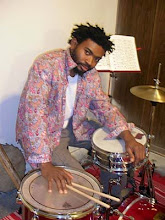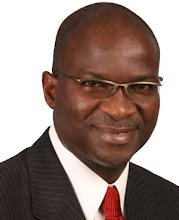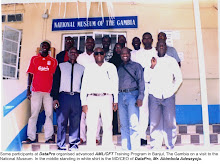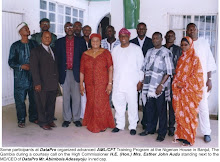Dayo Adejobi
Tosin Aribisala started out in his formative years as an artiste at a local church in Lagos in 1987. Gradually, his dexterity grew and drew large followers before he relocated
to the United States of America (USA). While in U S, he honed his creative skills and added other instruments. Aside drum, he plays African percussions like conga, cowbell, shekere and woodblock.
Going down memory lane on how it all started before he travelled, Aribisala said he went through several hands, including his father before he started out on his own.
According to him, his father was a strong influence on his music. “Outside my father, the major influential person in my music career was a man named Kunle Pinmiloye, a great teacher and drummer. He is an instructor who has maintained a reputation among his fans and peers for over 20 years as one of the very finest musicians on the traditional jazz and contemporary Nigerian music scene today. He was the first person who taught me how to read and interpret musical notations and drum rudiments. Another good teacher of mine was a Paris-based drummer called Moktar Samba, who gave me some lessons whenever I met him in France some years ago. Moktar actually expantiated extensively on what Kunle taught me in Nigeria”, he informed.
“I started performing with a professional band in 1996. The Sunny Neji Band was led by Sunny Neji himself, who recently toured the U.S. Initially I was with the band for about two months and was fired because I was not disciplined enough in keeping to time, that I was always late for rehearsals and gigs and overplaying instead of keeping a steady flow of rhythm. It was quite disappointing, but fortunately for me they called me back a few weeks later. At that time I had learned a big lesson about being more professional and disciplined on a gig. However, I was only there for less than a year before another opportunity came my way.”
The experience, he said, changed his whole attitude to music, time management and professionalism. “By then I have become a better person for it. Although as I was growing up, I was influenced by the music of the church in Nigeria which takes its root in the traditional or folk music of the land. So it is impossible to separate the two. The main differences are the lyrics and the hymns. Thus, I absorbed everything equally: church music and secular music at the same time”, Aribisala said.
Pigeonholing Aribisala as a drummer would be far from the point. Aside playing the drums, he also produces music, writes songs and performs. A true musician, he said, should be able to write, read and or interpret music. “The first song I wrote is called Harvester, which was written 11 years ago. I still perform it live. Actually, I just started performing it with my band about a year ago, and it has been rearranged for both vocal and instrumental versions. I always update my songs with new arrangements. It is like painting; you sketch out what you want to paint and you keep going back to the board to add this and that line or colour. I learned that from a Ghanaian painter who worked for my father and so I applied that to my music. Besides, I have come across some composers’ works that have been rearranged by themselves. The funny thing is that the rearrangement always take me by surprise. And that just inspires me to rework some of my compositions, which sometimes gives birth to two versions of the same song. That way the band does not get bored of playing the same song over and over.”
He explained significance of the Hallelujazz Project within this framework. “Besides my native Yoruba language that some listeners may not understand, the instrumental aspect of the music is what brings about the connection or attraction for the general listeners. This is because the instrumentation of my music is not so traditionally African but a marriage of Africa and jazz, and some Latin vibes. As a matter of fact, I also write some songs in English language, which is a more universal language that everyone could understand. I observed that in this age where the world is gradually evolving into a global village, especially with modern technology, Internet, media power, intermingling of cultures and so on, it is not difficult for people around the world to understand or connect with different cultures, music or fashion around us. I was exposed to American music -jazz, country, soul and R&B at a very early age. The same thing with Jamaican reggae music and the Rasta Movement, and many other cultures while I was still in Nigeria years ago. So, I believe the same thing could be happening to someone else in another part of the world. That way we all can easily relate to the same type of music, outfit, food, religion and what have you, think, see and feel.this is what Hallelujazz Project is all about.”
On a final note, Aribisala describes his music as very original and pleasant to the ears. He says his newly released CD, Hallelujazz Project is rarity in jazz, gospel and contemporary. The drummer moved to the U.S. in 2001. Since his arrival, he has been involved in numerous musical projects, one of which was the “Red Hot & Riot” CD - a tribute to the legendary Nigerian musician, composer, multi-instrumentalist and pioneer of Afro beat music, the late Fela Anikulapo Kuti, who died in 1997.
Tapping from his vast experience, Aribisala has developed a wide range of drumming styles, which include fusion, reggae, R&B, hip-hop, afrobeat, gospel, juju and the traditional African drumming patterns associated with what he calls the Konkolo style. In addition to playing, writing and producing music, he is also a teacher of drumming art from which he derives a great deal of satisfaction.
Aribisala is the leader Hallelujazz Project, a band he put together in 2002. Some key members of the band are Cheikh Ndoye on Bass, Ben Bokor on Sax and vocalist Monica Ssali.
Subscribe to:
Post Comments (Atom)
















No comments:
Post a Comment